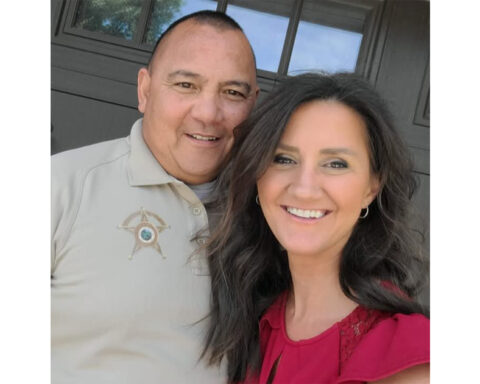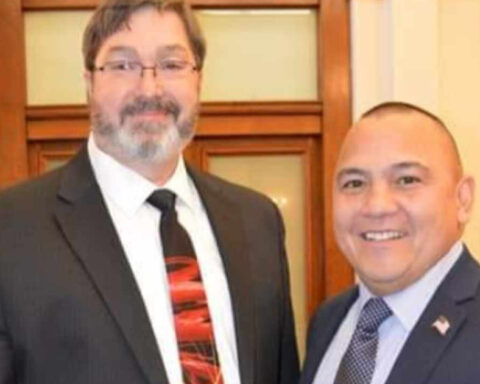FRANKFORT, Ind. (October 28, 2024) – Clinton County Sheriff’s Deputy Melissa Trump sat down for an interview on October 24th to discuss the recent Merit Board hearing decision, ongoing investigations, and the future of her career. During the hour plus long conversation, Deputy Trump expressed mixed emotions about the outcome of the hearing and raised concerns about procedural issues regarding the arrest of her son during the hearing, potential bias against her, and the impact on her future in law enforcement.
The Merit Board found Deputy Trump violated four Merit Board Rules and Regulations of the five charges filed by Sheriff Rich Kelly.
The four charges Deputy Trump violated according to the Merit Board Findings of Fact, Conclusions, and Decision document are: Conduct Unbecoming to An Officer; Conformance to Laws; Individual Obligation and Duties of All Personnel; and Truthfulness. The charge of Testimony was not substantiated.
The Merit Board voted 3-1 to impose a disciplinary penalty of 30 working days without pay based on its preceding findings. Sheriff Kelly had asked for termination.
While the Merit Board’s decision to impose a 30 working day suspension without pay could be viewed as a victory, Deputy Trump expressed reservations, acknowledging the possibility of continued investigations and the financial burden of legal representation. She stated, “although this was a win, it still doesn’t really feel like a win because I don’t think I’m actually ever going to get to be a police officer after this. I don’t think that after my 30 days I just come back to work. I think I’m going to be under another investigation.”
When asked about the financial impact of the suspension, Deputy Trump noted a 30 working day suspension would financially equate to “losing two months of pay.”
Deputy Trump believes that the Merit Board mischaracterized her statements regarding her knowledge of underage drinking at a restaurant with her son’s girlfriend, Tess. She explained that while she was present when Tess was served alcohol, she did not provide it.
She learned Tess was not 21 approximately a week before attending the birthday. She expressed frustration that her testimony, including statements made during a polygraph examination, were taken out of context.
Deputy Trump shared what she was attempting to convey to both the Merit Board and polygrapher, saying:
“That wasn’t me allowing her to drink. So I thought that was kind of unfair. We’re at that restaurant, just because I didn’t dive across the table and, you know, super man that shot away from her – wasn’t me allowing.
“I thought that was just kind of unfair to use that against me, that these are things that I admitted during a polygraph to be as truthful as they could. And then those things just get used against me, it just seems very unfair and it feels like it was taken out of context.”
Furthermore, Deputy Trump addressed the Board’s finding that she expressed the viewpoint that minor consumption is a “bulls*** charge.” She clarified her stance, stating that while she acknowledges the illegality of underage drinking, she believes law enforcement officers have discretion in handling such offenses, especially when more serious crimes require their attention. She drew comparisons to other minor offenses, such as speeding and marijuana possession, where officers often choose not to make arrests.
During the October 16th Merit Board hearing, Deputy Trump testified to being dispatched to an underage drinking party where no arrests were made. She elaborated during our call on the discretion she has used and her thoughts on why discretion is necessary.
“(The Sheriff) knows there’s no way … he thinks we arrest every single person in Clinton County that commits a crime,” said Deputy Trump. “Our jail (wouldn’t) be big enough. We would have the majority of the county possibly in there.
“I don’t know. There’s times, so for example, some of these things that I guess they’re against the law but they can seem sort of minor and something that we maybe don’t typically arrest for.
“We have discretion. [referencing the underage drinking party] We didn’t arrest anybody there. We still handled the situation in a manner that we felt like we could still have an impact and not have to take all of these kids to jail.
“It wasn’t, it just didn’t seem, although yes it’s illegal to drink. It just did not seem serious enough, I guess.
“And all the times where I can think about where we pull people over and we’ve caught them with marijuana on them and you know we throw it out and we don’t arrest them or times where we pull people over for driving while suspended which is a misdemeanor and we don’t arrest them. We don’t arrest every single person that we know to commit a crime.”
Deputy Trump’s interview also shed light on the complexities of “Giglio” disclosures, which involve potential credibility issues that must be disclosed to defense attorneys in criminal cases. The interview revealed confusion surrounding the process and whether a Giglio designation had been made in her case – there was no mention of Giglio in the final report.
Clinton County Prosecutor Anthony Sommer testified in Deputy Trump’s Merit Board hearing stating he would wait until the conclusion of the Merit Board hearing and receiving its findings before making a final determination on a Giglio designation.
Deputy Trump also discussed the circumstances surrounding her son’s arrest on a warrant for failure to appear in court. She emphasized that the warrant was issued out of Marion County and was non-extraditable, meaning that typically, arrests could only be made within that county. Despite this, her son was arrested in Clinton County, two counties away. Deputy Trump expressed concern that this arrest, which involved a deputy in plain clothes who ordered her son, Blake Trump, out of the car, was an abuse of power and an act of retaliation. She also questioned the legality of special deputies serving warrants off government property; her son was parked on Harrison St. across from the Sheriff’s Office.
During the phone interview, Deputy Trump discussed the case of a former Clinton County K9 officer, Joey Mitchell, and his dog, Rip. She alleged that Sheriff Kelly gave a misleading account of Rip’s fate to the Commissioners, claiming that the dog was given to a company specializing in re-training police dogs when, in fact, he was given to a former jail officer who is the owner of the above referenced company. Deputy Trump expressed concern for Rip’s well-being and questioned the decision-making process that led to his reassignment.
Clinton County Today has not yet been able to independently verify the allegations made by Deputy Trump regarding former K9 Rip as well as the statements surrounding the enforcement of an outstanding warrant on her son.
Looking ahead, Deputy Trump acknowledged the uncertainty of her future with the Clinton County Sheriff’s Office. She indicated that if no further charges are filed, she would anticipate staying until retirement, but also acknowledged that the outcome of her EEOC complaint could impact her ability to remain with the department. She also expressed reservations about seeking employment with another agency due to the potential difficulty of obtaining a favorable recommendation from her current employer.
Deputy Trump concluded the interview by emphasizing her commitment to transparency and accountability. She stated, “I like being transparent. I like people, I don’t have anything to hide. So I don’t mind getting my story out there. And thank you for covering it.”
The audio of the interview can be found on Spotify or wherever you enjoy listening to podcasts.







